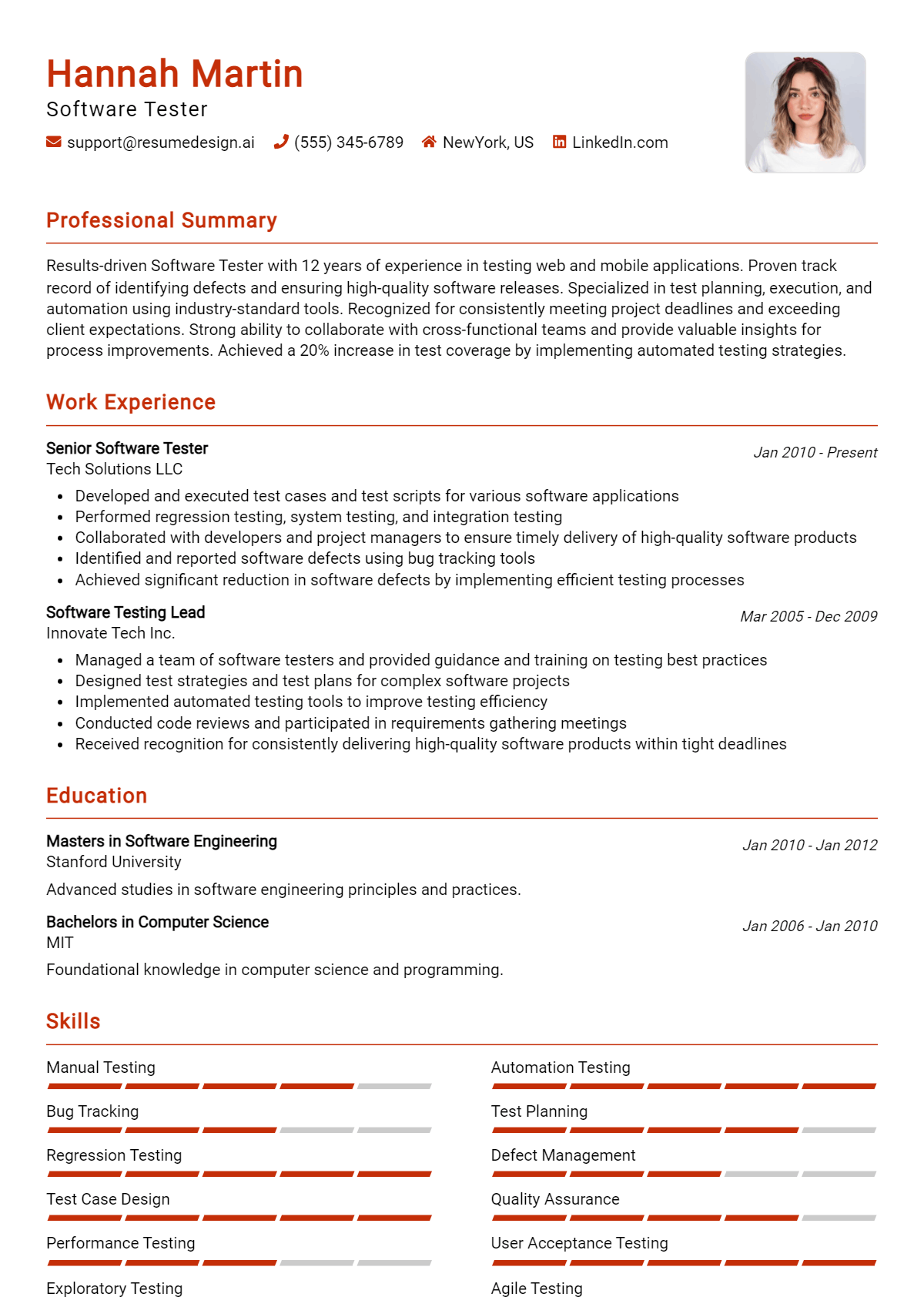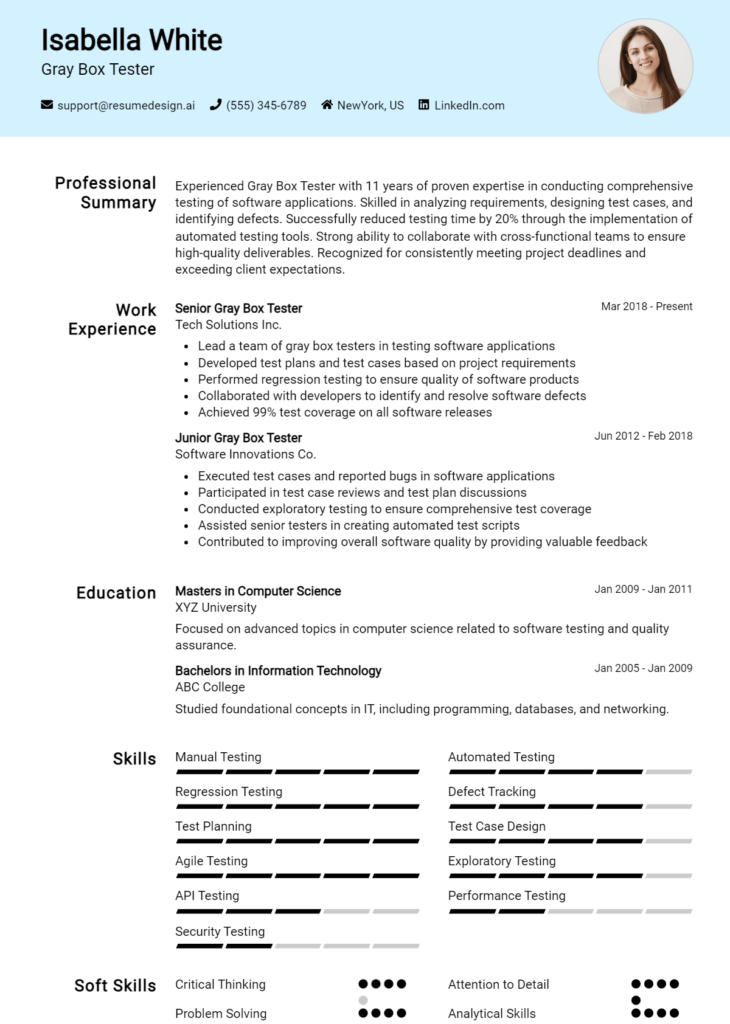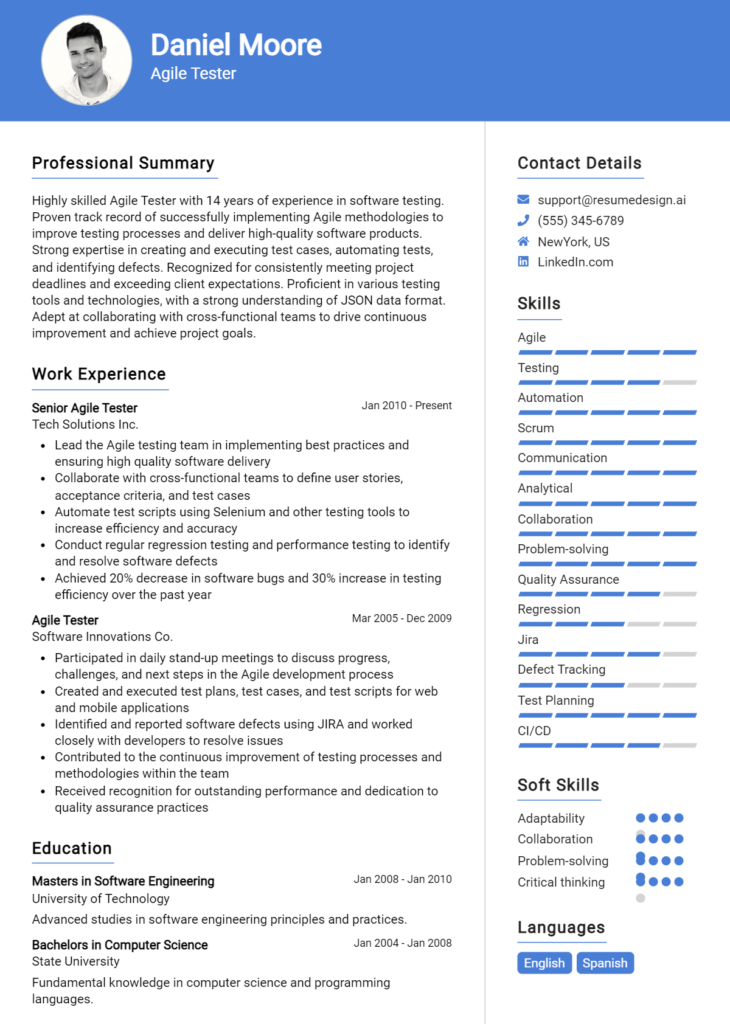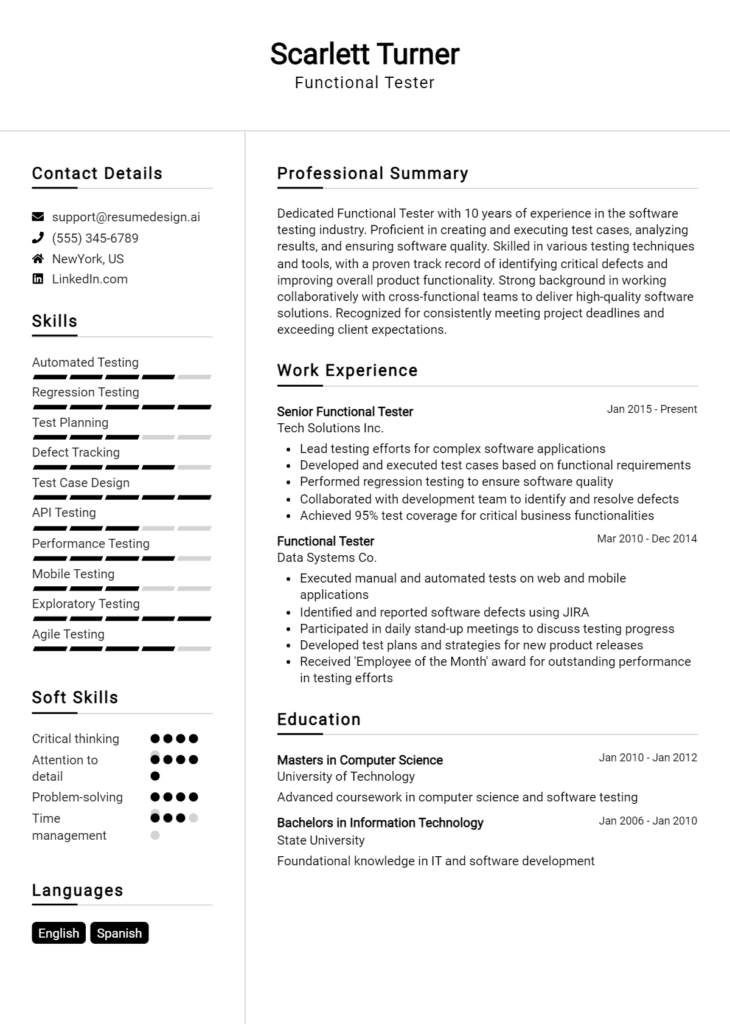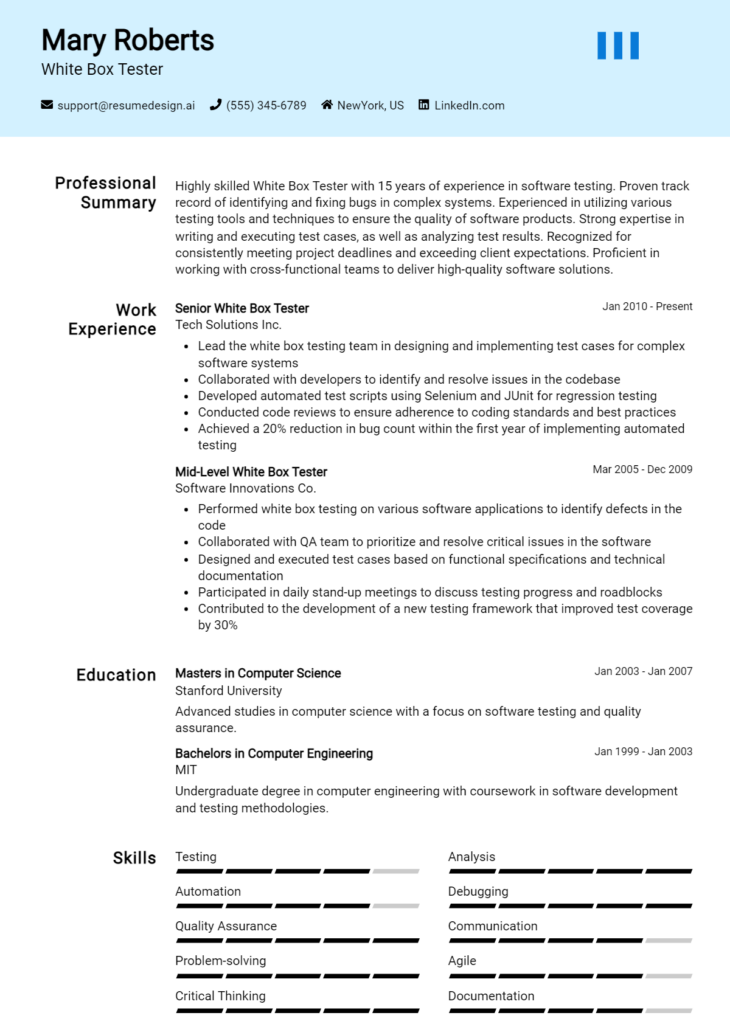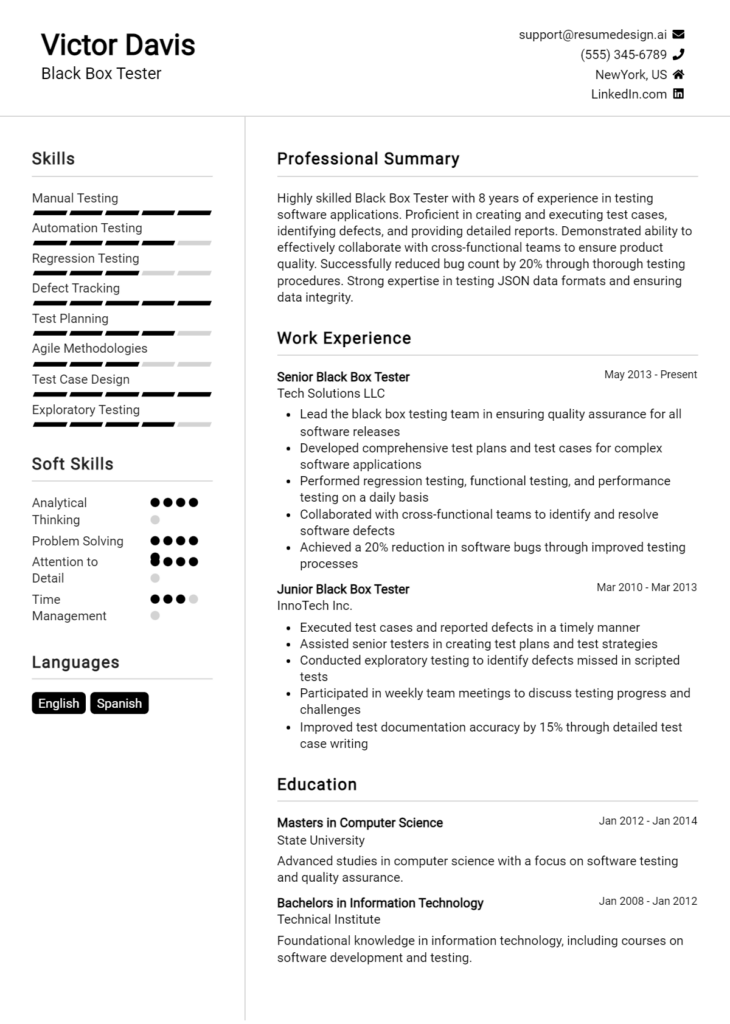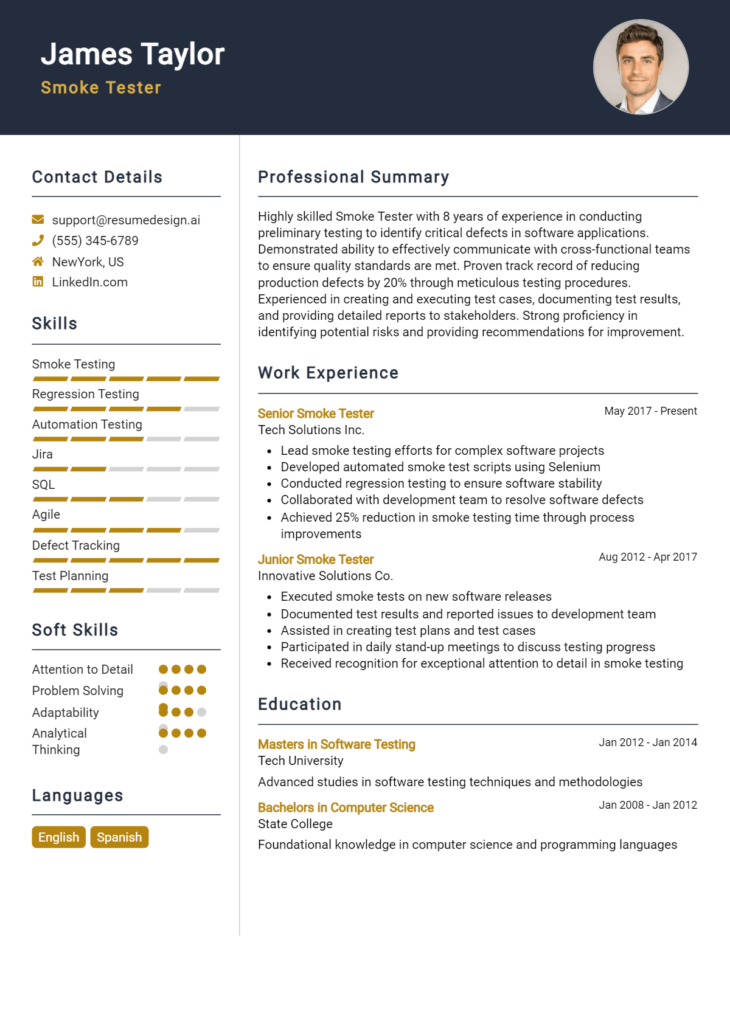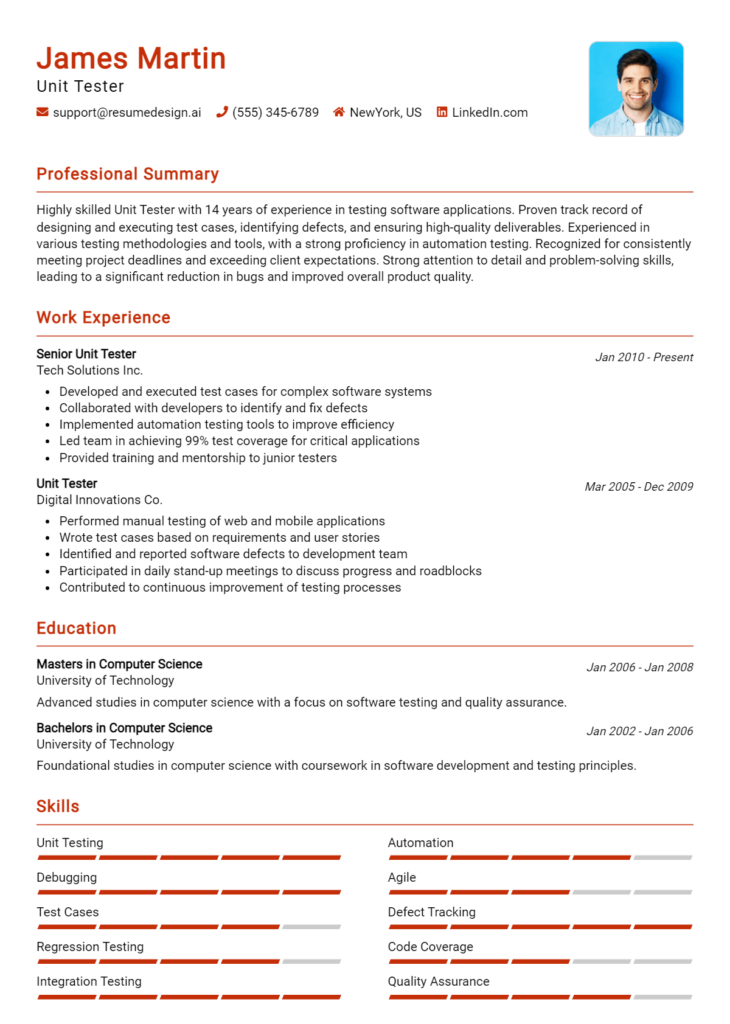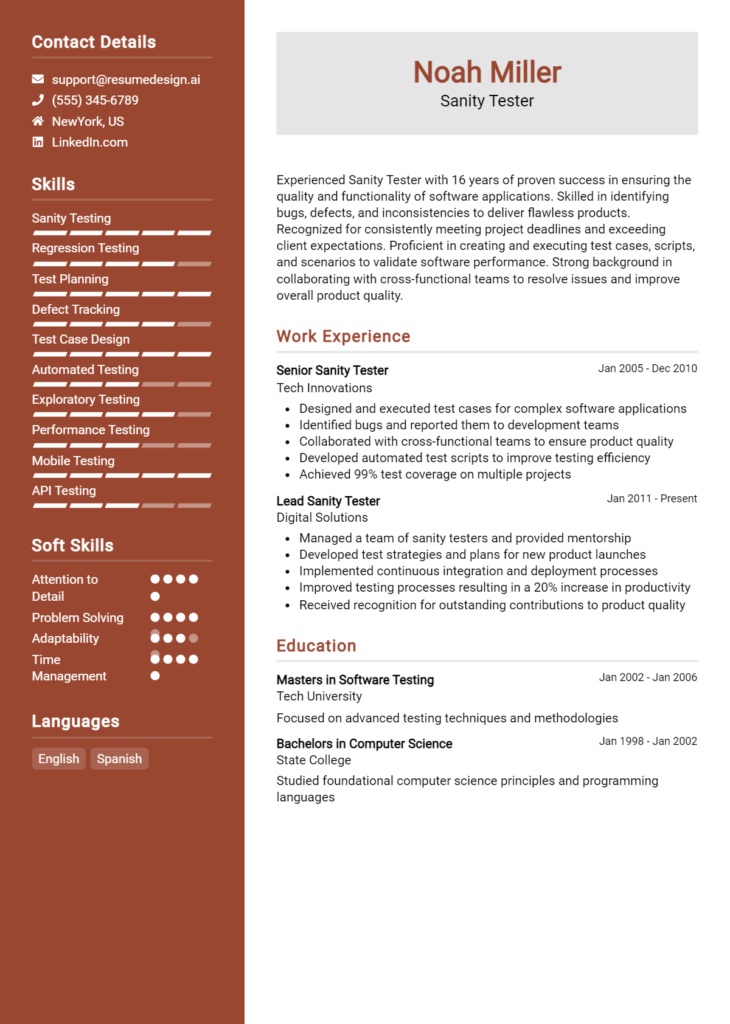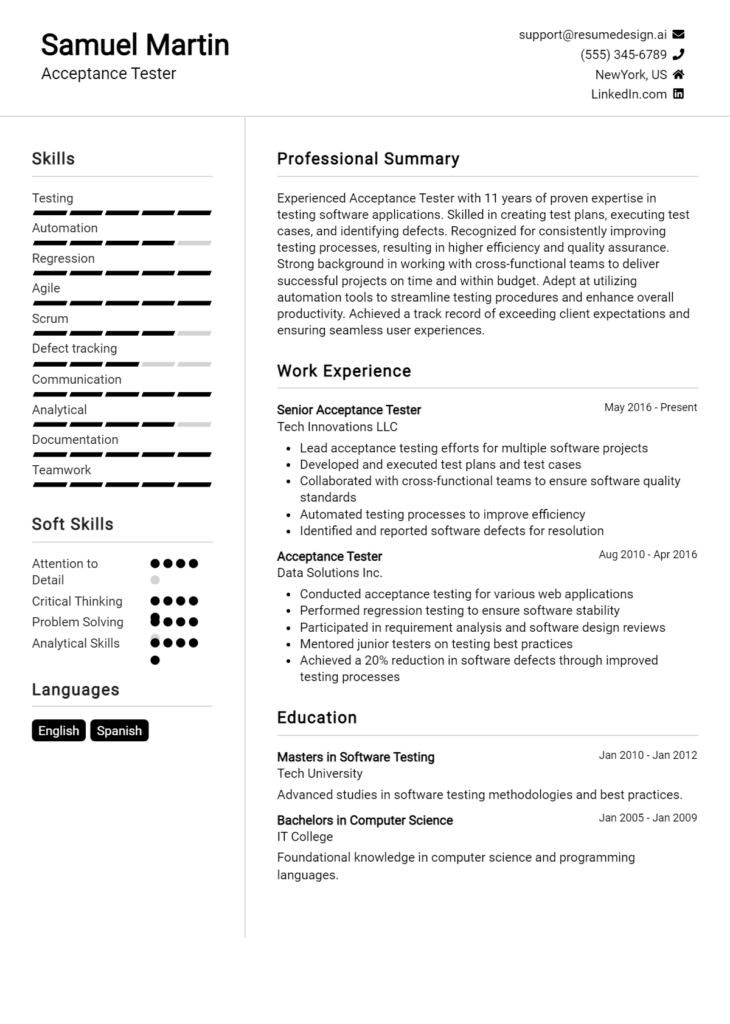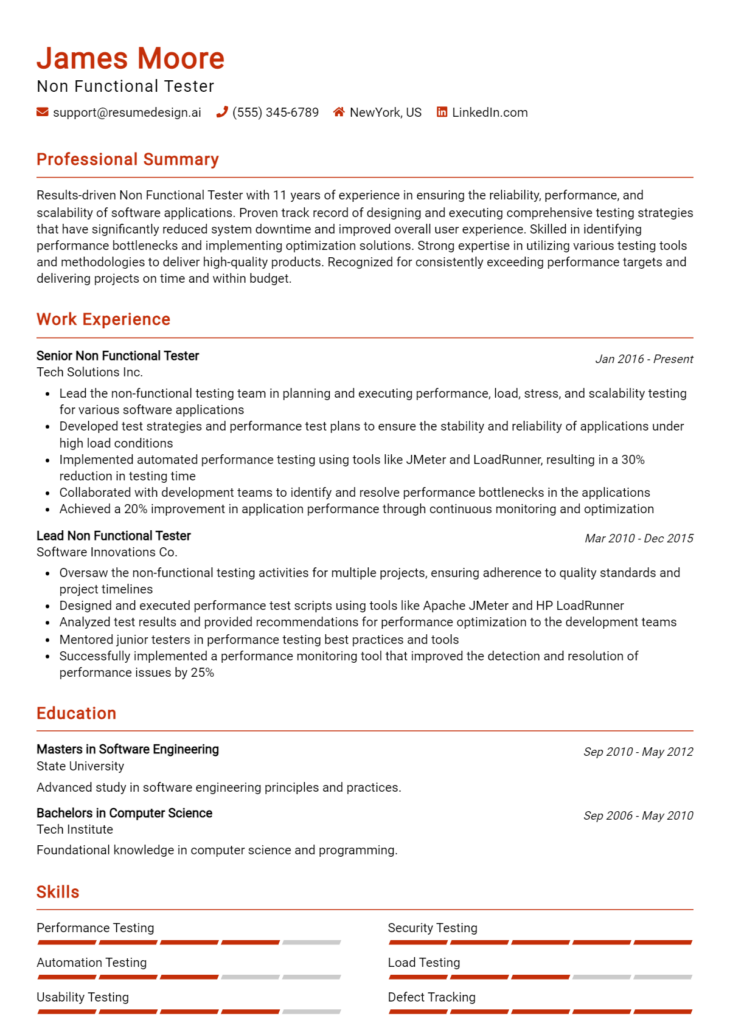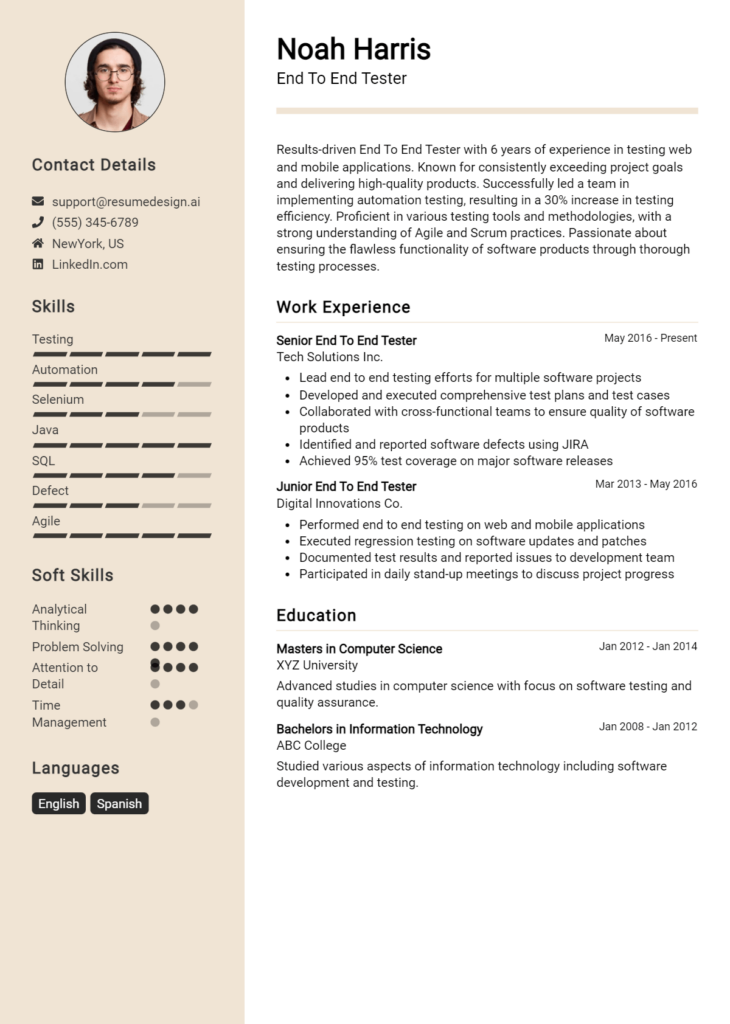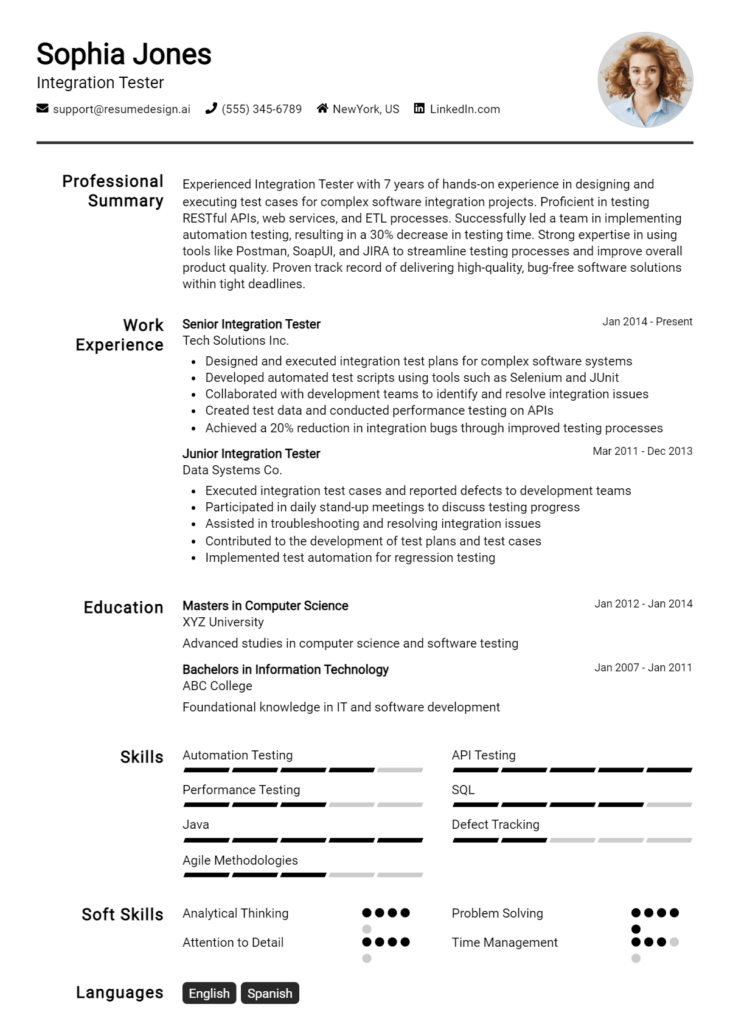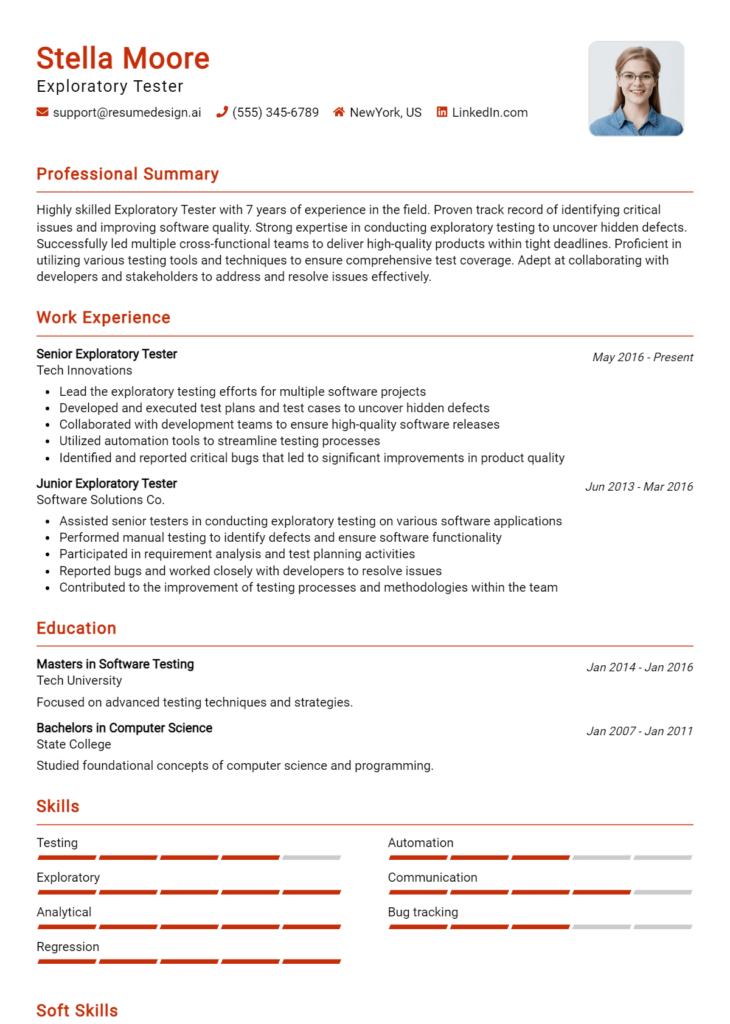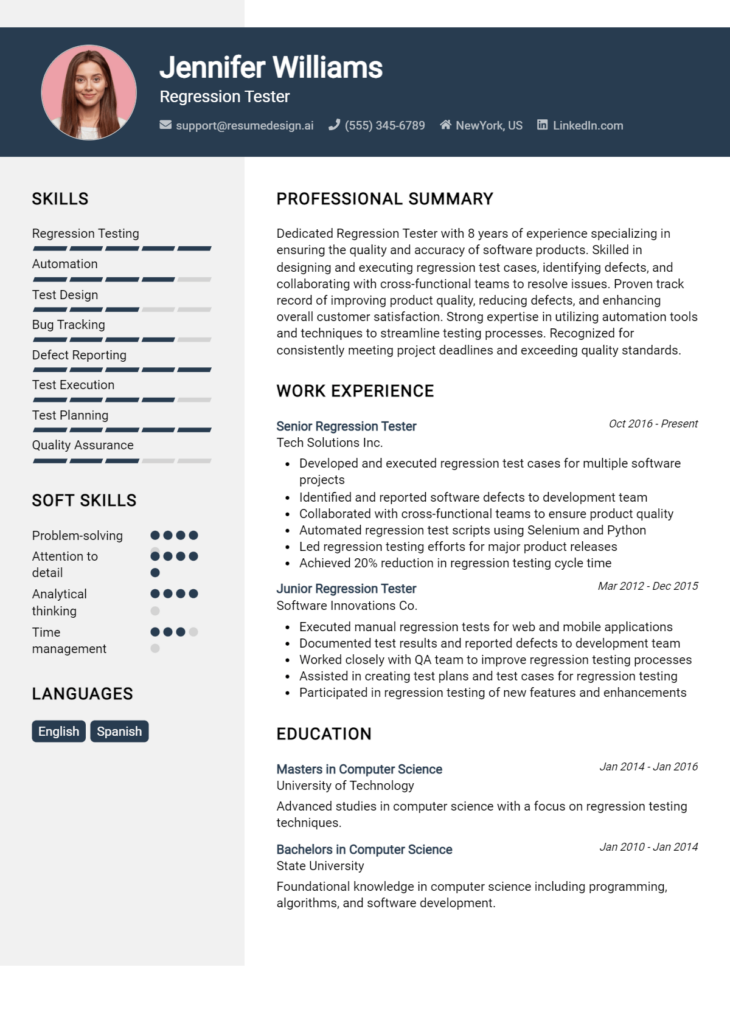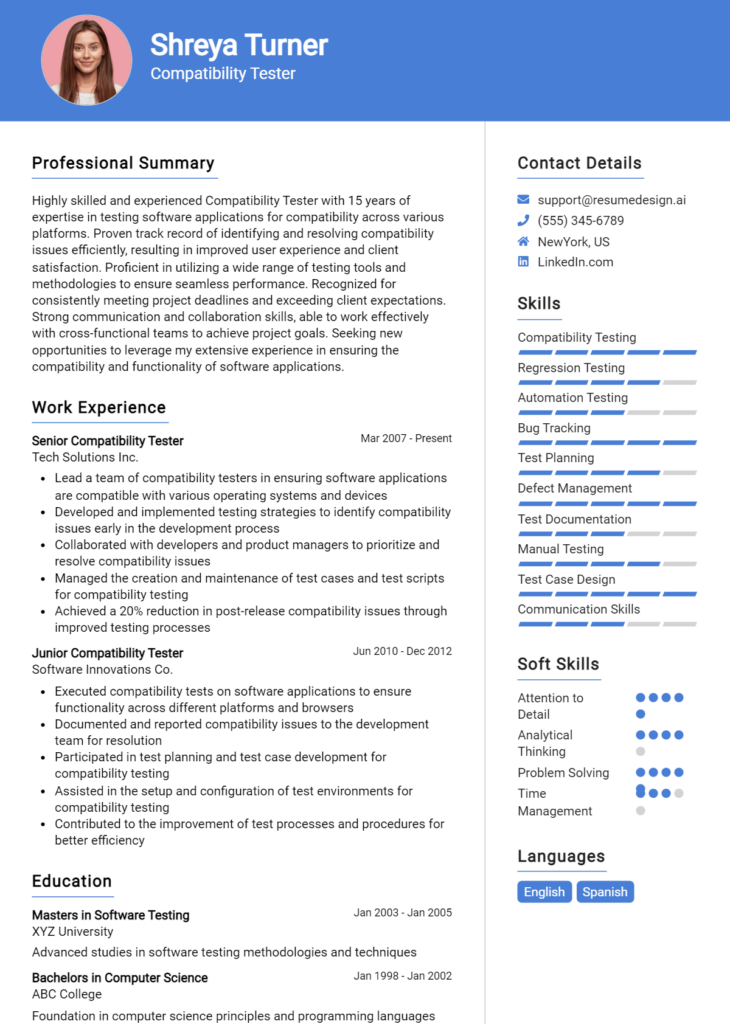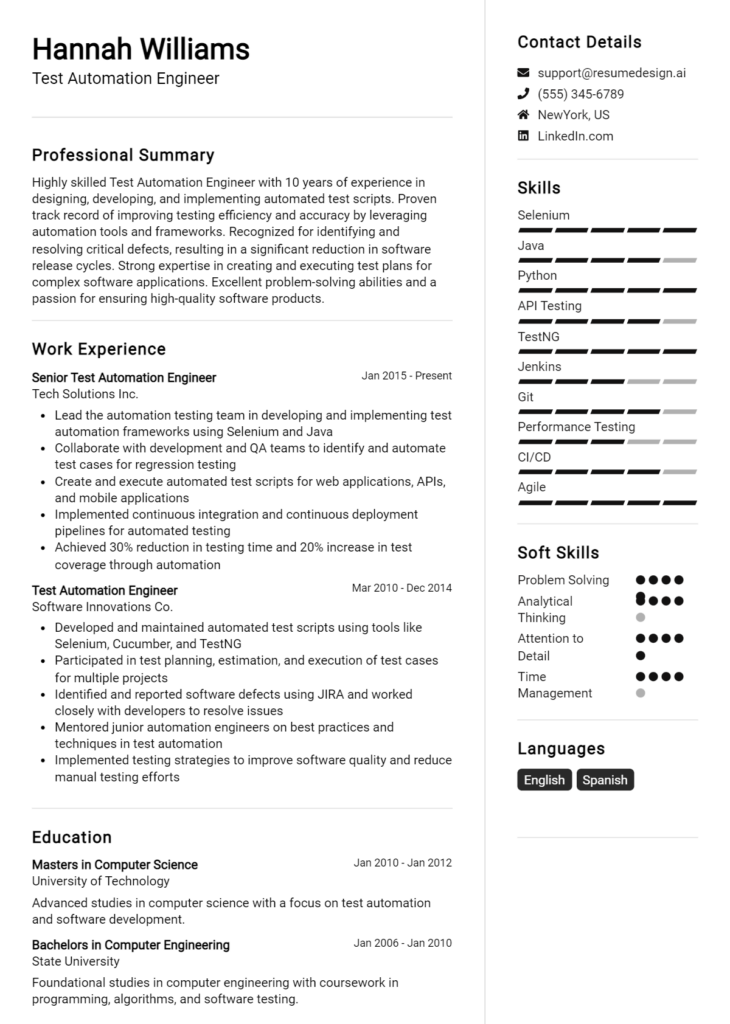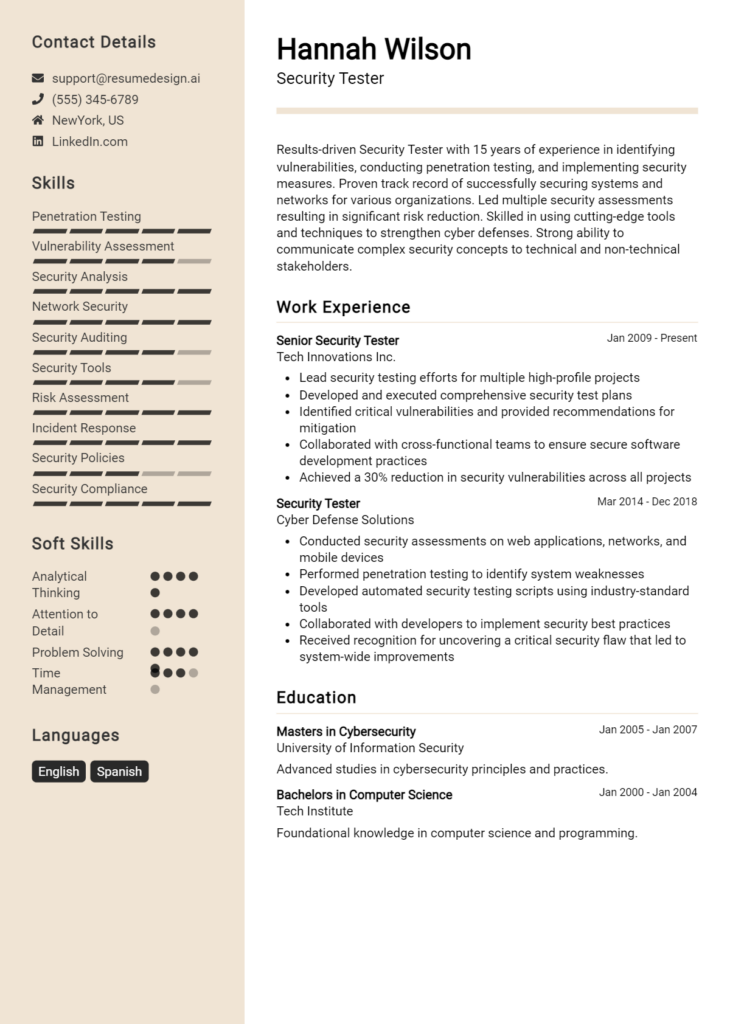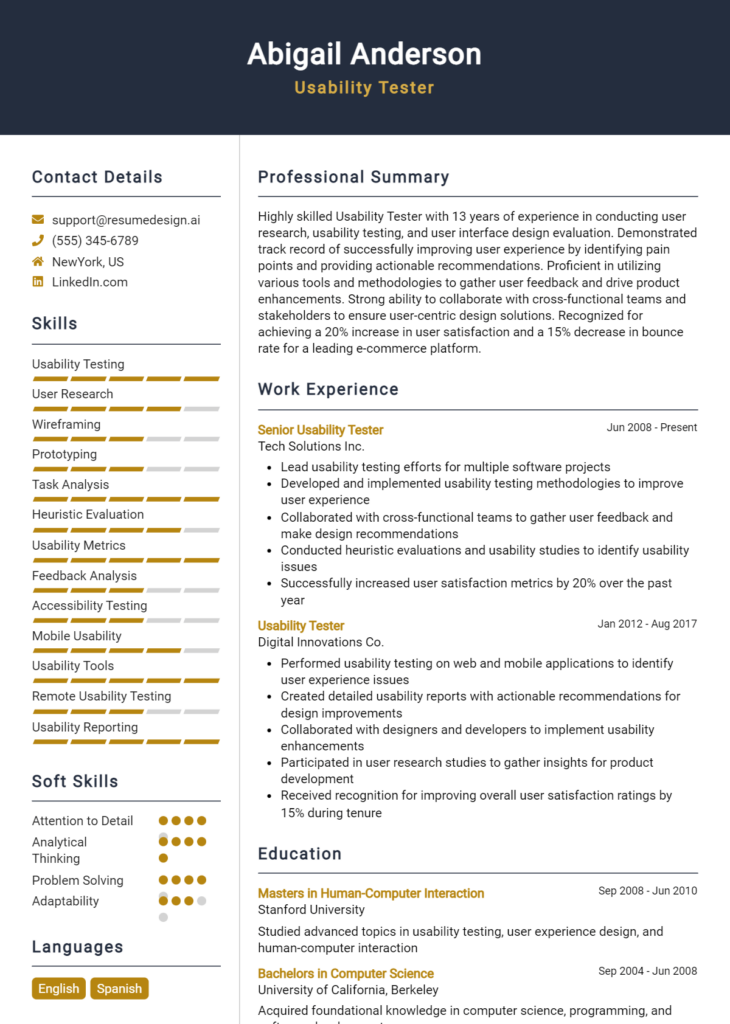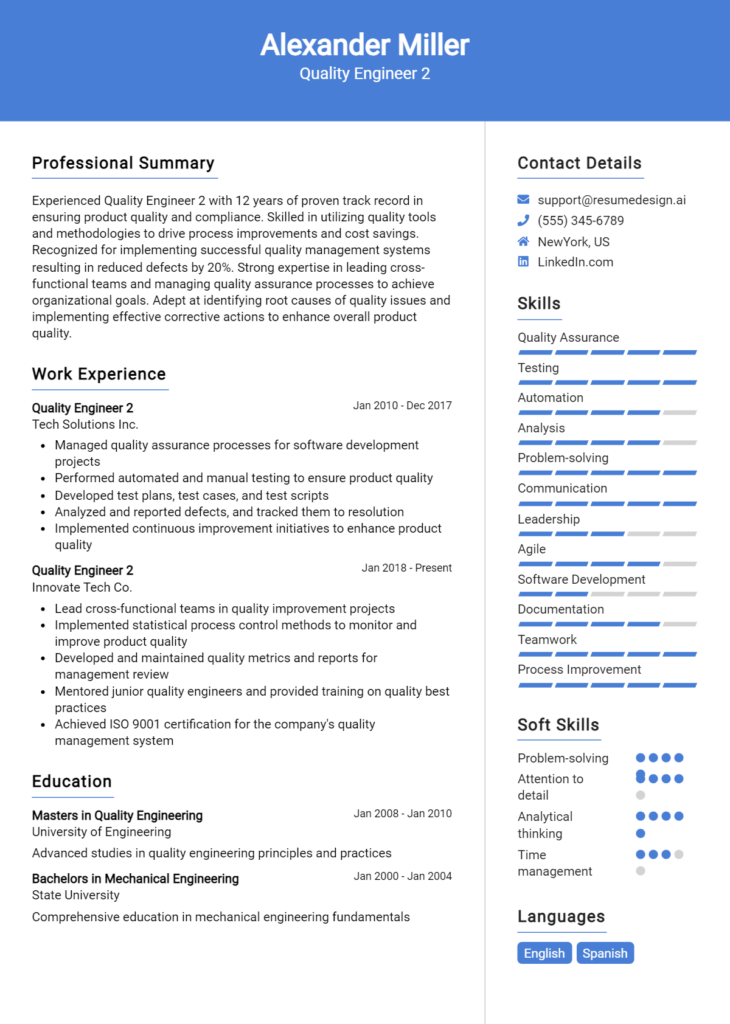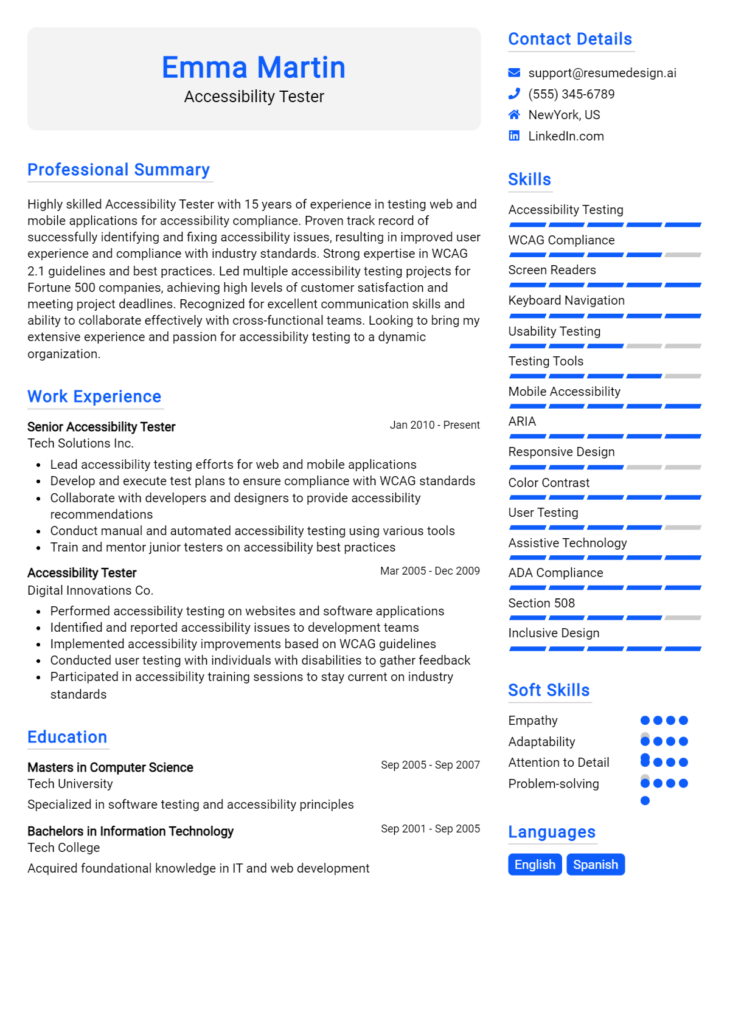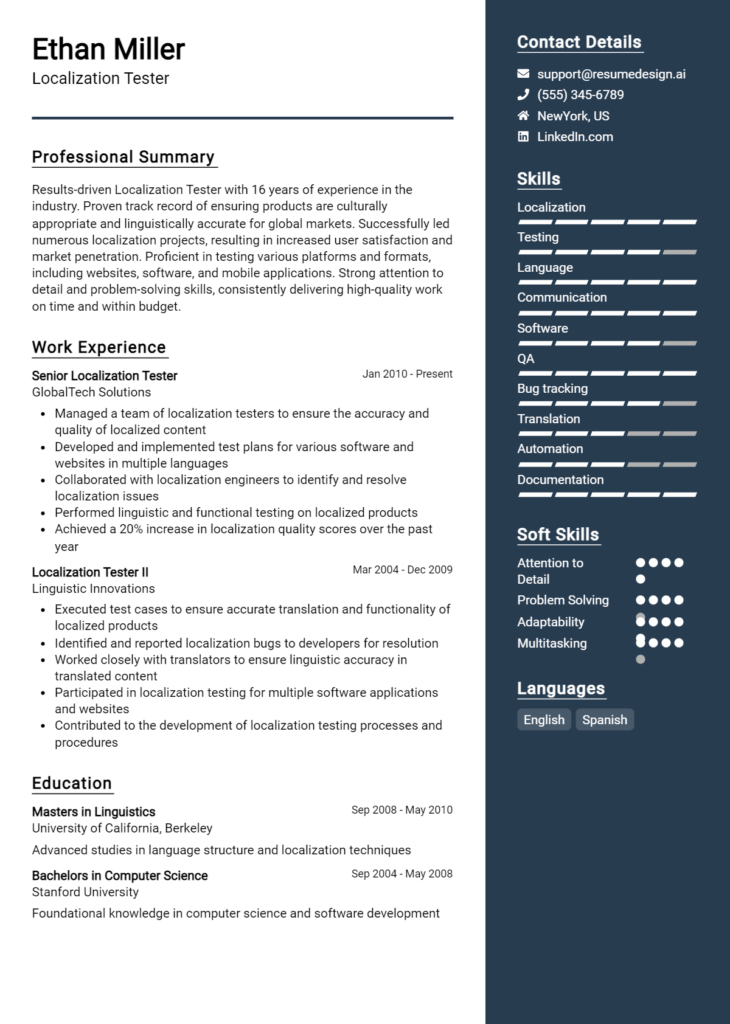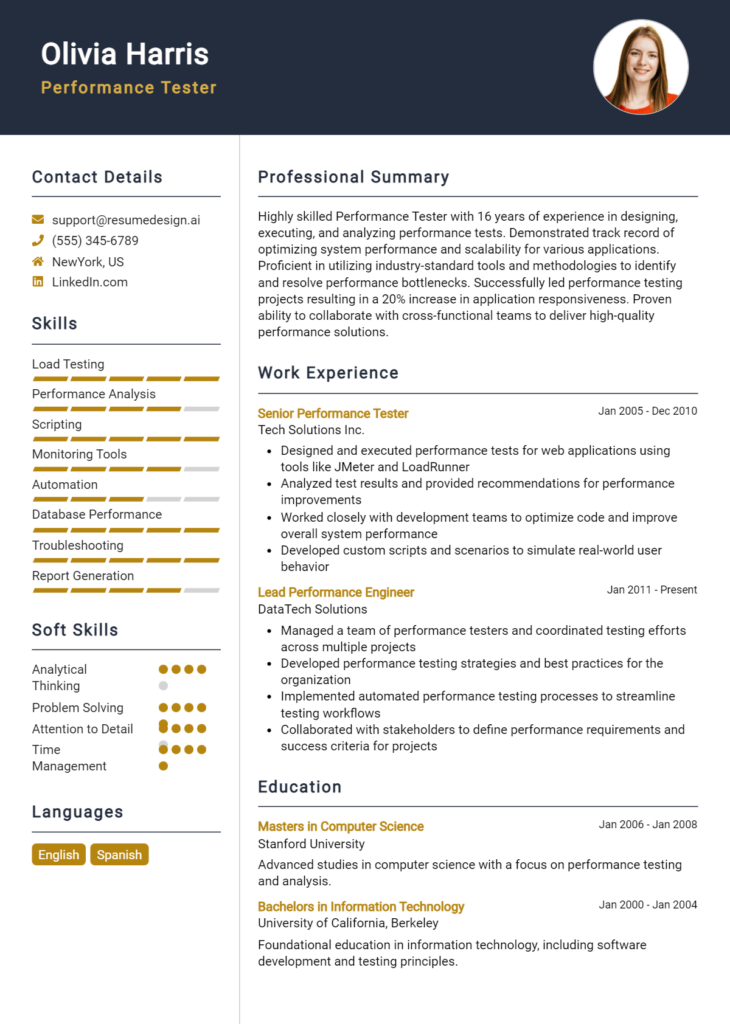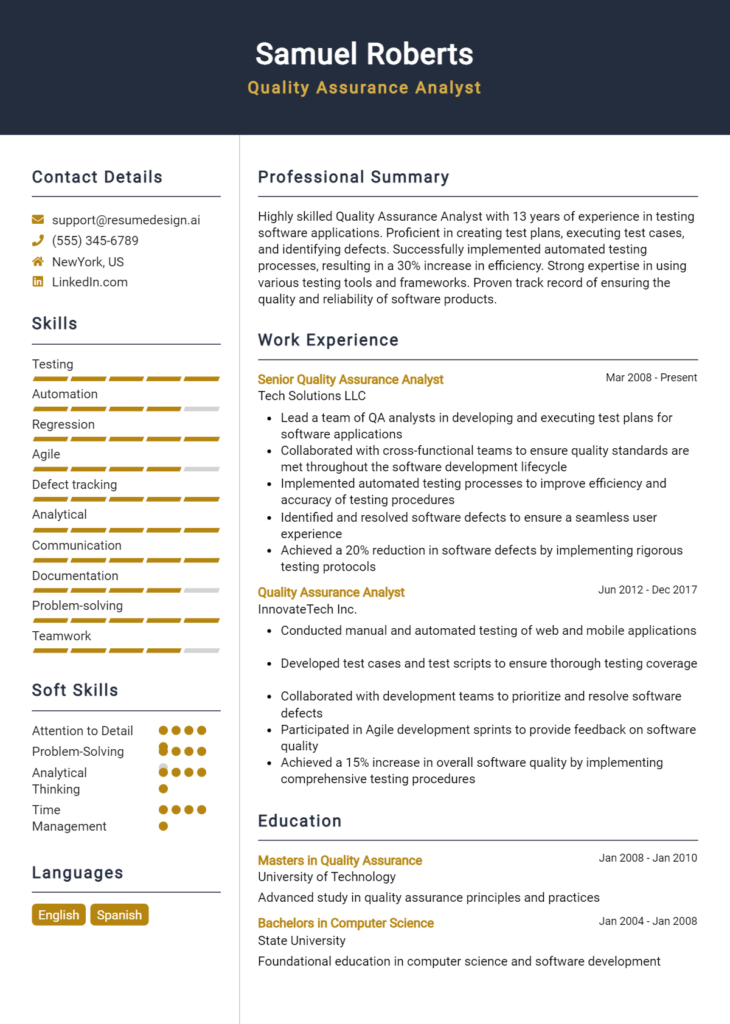Software Tester Core Responsibilities
A Software Tester plays a crucial role in the development lifecycle, ensuring that software products meet quality standards before release. Key responsibilities include designing test plans, executing tests, and documenting results. This role requires strong technical skills in programming and testing tools, as well as operational expertise to understand user requirements. Problem-solving abilities are essential for identifying and addressing issues efficiently. By bridging development and operations, Software Testers contribute significantly to organizational goals, and a well-structured resume can effectively highlight these qualifications.
Common Responsibilities Listed on Software Tester Resume
- Developing and executing test plans and test cases.
- Identifying, documenting, and tracking defects.
- Collaborating with developers and product managers to understand requirements.
- Performing regression testing after fixes and enhancements.
- Automating repetitive testing tasks using appropriate tools.
- Conducting performance and load testing.
- Participating in requirement reviews to ensure testability.
- Creating and maintaining detailed test documentation.
- Reporting test progress and results to key stakeholders.
- Staying updated on industry trends and best practices in testing.
High-Level Resume Tips for Software Tester Professionals
In today's competitive job market, a well-crafted resume serves as a crucial tool for Software Tester professionals aiming to make a strong first impression on potential employers. Your resume is often the initial point of contact, reflecting not only your technical skills but also your achievements and experience in the field. It’s essential that it showcases your ability to identify software defects, ensure quality assurance, and contribute positively to the development process. This guide will provide practical and actionable resume tips specifically tailored for Software Tester professionals, helping you to stand out from the crowd.
Top Resume Tips for Software Tester Professionals
- Tailor your resume to match the job description by using relevant keywords and phrases from the posting.
- Highlight your experience with various testing methodologies, such as manual testing, automated testing, and performance testing.
- Quantify your achievements by using metrics, such as the percentage of defects caught before release or improvements in testing efficiency.
- Showcase your proficiency with testing tools and technologies, including Selenium, JIRA, or TestRail, to demonstrate your technical expertise.
- Include any relevant certifications, such as ISTQB or CSTE, to validate your skills and knowledge in software testing.
- Emphasize your collaboration skills by mentioning experiences working with developers, product managers, and other stakeholders.
- Detail your problem-solving abilities by providing examples of how you identified and resolved critical issues during testing phases.
- Utilize a clean and professional format that makes your resume easy to read and visually appealing.
- Keep your resume concise, ideally one page, while ensuring you include all relevant information and experiences.
By implementing these tips into your resume, you can significantly enhance your chances of landing a job in the Software Tester field. A well-structured and tailored resume not only showcases your qualifications but also conveys your commitment to quality and attention to detail, traits that are highly valued by employers in the software industry.
Why Resume Headlines & Titles are Important for Software Tester
In the competitive field of software testing, a well-crafted resume headline or title can serve as a powerful tool for candidates to distinguish themselves from the crowd. This brief yet impactful phrase gives hiring managers an immediate glimpse into the candidate's qualifications, skills, and experience, setting the tone for the rest of the resume. A strong headline not only captures attention but also succinctly summarizes key qualifications that align with the job being applied for. Therefore, it is crucial for software testers to ensure that their resume headlines are concise, relevant, and tailored to reflect their expertise in the domain.
Best Practices for Crafting Resume Headlines for Software Tester
- Keep it concise: Aim for one impactful phrase that summarizes your qualifications.
- Be role-specific: Clearly indicate your expertise in software testing to attract the right attention.
- Highlight key skills: Incorporate relevant skills or tools that are sought after in the job description.
- Use industry keywords: Include terminology that aligns with the software testing field to enhance visibility.
- Showcase accomplishments: If possible, mention notable achievements that emphasize your value.
- Tailor for each application: Customize your headline for each position to reflect the specific requirements and preferences of the employer.
- Avoid jargon: Use clear and straightforward language to ensure your headline is easily understood.
- Maintain professionalism: Ensure that the tone is formal and aligned with industry standards.
Example Resume Headlines for Software Tester
Strong Resume Headlines
Detail-Oriented Software Tester with 5+ Years of Experience in Automated Testing
Certified Software Quality Assurance Specialist Focused on Agile Methodologies
Results-Driven Software Tester Skilled in Selenium and Test Automation
Experienced Software Tester with Proven Track Record in Bug Detection and Resolution
Weak Resume Headlines
Software Tester Looking for Opportunities
Test Engineer
Hardworking Individual Seeking Software Testing Role
The strong headlines are effective because they provide specific information about the candidate's experience, skills, and focus areas, making them immediately relevant to hiring managers. They use industry-specific language and highlight key attributes that align with the job requirements. In contrast, the weak headlines fail to impress due to their vagueness and lack of relevant detail, making it difficult for employers to gauge the candidate's suitability for the position. Clear, tailored, and impactful headlines can significantly enhance a resume's effectiveness in the competitive job market.
Writing an Exceptional Software Tester Resume Summary
A well-crafted resume summary is crucial for a Software Tester, as it serves as the first impression to hiring managers. This succinct introduction allows candidates to highlight their key skills, relevant experiences, and notable accomplishments in a way that immediately captures attention. By presenting a compelling summary, candidates can quickly convey their fit for the role, making it easier for hiring managers to assess their qualifications. Therefore, a strong resume summary should be concise, impactful, and specifically tailored to the job being applied for, ensuring that it aligns with the needs of the employer.
Best Practices for Writing a Software Tester Resume Summary
- Quantify achievements: Use specific numbers or percentages to highlight your impact.
- Focus on relevant skills: Highlight technical skills and tools relevant to software testing.
- Tailor the summary: Customize your summary for each job application to reflect the job description.
- Use action verbs: Start sentences with strong action verbs to convey your contributions effectively.
- Keep it concise: Aim for 2-3 sentences that are direct and to the point.
- Showcase certifications: Include any relevant certifications or training in software testing.
- Highlight teamwork: Mention collaboration with developers and other stakeholders to improve product quality.
- Emphasize problem-solving skills: Demonstrate your ability to identify issues and implement effective solutions.
Example Software Tester Resume Summaries
Strong Resume Summaries
Detail-oriented Software Tester with over 5 years of experience in manual and automated testing. Successfully reduced bugs by 30% through diligent testing and collaboration with development teams, ensuring a seamless release of multiple software applications.
Results-driven QA Engineer with expertise in Selenium and JIRA, managing testing processes for over 15 projects. Improved testing efficiency by implementing automated scripts, leading to a 25% decrease in testing time and a 15% increase in product quality.
Accomplished Software Tester with a proven track record in Agile environments. Led a team of testers that delivered software solutions with 98% accuracy, significantly enhancing user satisfaction ratings by 20% in the last project cycle.
Weak Resume Summaries
Software Tester with some experience in testing software. Good at finding issues.
Dedicated QA professional looking for a position to utilize my skills and contribute to the team.
The strong resume summaries stand out due to their specificity and quantifiable achievements, demonstrating the candidate's value and direct relevance to the role. In contrast, the weak summaries lack detail and do not highlight any measurable outcomes or specific skills, making them less compelling to potential employers.
Work Experience Section for Software Tester Resume
The work experience section of a Software Tester resume is a critical component that not only showcases the candidate's technical skills but also emphasizes their ability to manage teams and deliver high-quality products. This section provides potential employers with insights into the candidate's hands-on experience in software testing, highlighting their proficiency in various testing methodologies, tools, and technologies. Additionally, it is essential for candidates to quantify their achievements and align their experiences with industry standards, as this approach significantly enhances their credibility and appeal to prospective employers.
Best Practices for Software Tester Work Experience
- Utilize action verbs to describe your responsibilities and achievements, showcasing your proactive approach.
- Quantify your results where possible, using metrics such as the percentage of bugs found or the reduction in testing time.
- Highlight specific testing tools and technologies you have used, demonstrating your technical expertise.
- Include collaborative projects to showcase your ability to work effectively in teams.
- Focus on outcomes that contributed to the overall success of the product, such as improved user satisfaction or reduced deployment times.
- Tailor your experiences to match the job description, ensuring relevance to the position you are applying for.
- Keep descriptions concise yet informative, avoiding unnecessary jargon while maintaining a professional tone.
- Use bullet points for clarity, ensuring each point is easy to read and digest for hiring managers.
Example Work Experiences for Software Tester
Strong Experiences
- Led a team of 5 software testers in a project that identified and resolved 95% of critical bugs before product launch, resulting in a 30% increase in customer satisfaction ratings.
- Implemented automated test scripts using Selenium, reducing manual testing time by 40% and accelerating the release cycle by two weeks.
- Collaborated with cross-functional teams to develop a comprehensive test strategy that improved overall product quality, leading to a 20% decrease in post-release defects.
Weak Experiences
- Performed testing on various software applications.
- Worked in a team environment to complete projects.
- Conducted quality assurance tests for software products.
The strong experiences listed demonstrate specific accomplishments and quantifiable results, showcasing the candidate's technical leadership and collaborative skills. In contrast, the weak experiences are vague and lack detail, offering little insight into the candidate's actual contributions or impact on projects. This distinction highlights the importance of providing clear, measurable outcomes in the work experience section to effectively communicate one's value to potential employers.
Education and Certifications Section for Software Tester Resume
The education and certifications section of a Software Tester resume is crucial as it provides a snapshot of the candidate's academic background, relevant certifications, and commitment to continuous learning. This section not only showcases the formal education that forms the foundation of a testing career but also highlights specialized certifications that demonstrate the candidate's expertise in industry-standard practices and methodologies. By detailing relevant coursework and any specialized training, candidates can significantly enhance their credibility and ensure alignment with the specific requirements of the role they are applying for.
Best Practices for Software Tester Education and Certifications
- Prioritize relevant degrees in Computer Science, Information Technology, or Software Engineering.
- Include industry-recognized certifications such as ISTQB, CSTE, or Certified Agile Tester.
- Detail relevant coursework that aligns with software testing methodologies, tools, and practices.
- Highlight any specialized training in automation testing, performance testing, or security testing.
- List certifications in the order of relevance to the job you are applying for.
- Keep the information concise and focused on qualifications that enhance your candidacy.
- Regularly update the section to reflect any new certifications or educational achievements.
- Consider including workshops or seminars attended that pertain to software testing and quality assurance.
Example Education and Certifications for Software Tester
Strong Examples
- Bachelor of Science in Computer Science, University of XYZ, Graduated May 2022
- ISTQB Certified Tester, Foundation Level, Issued March 2023
- Advanced Software Testing Certification, Completed January 2023
- Relevant Coursework: Software Quality Assurance, Automated Testing Strategies, Database Management Systems
Weak Examples
- High School Diploma, ABC High School, Graduated June 2018
- Certification in Basic Computer Skills, Issued 2010
- Degree in Culinary Arts, University of Cooking, Graduated 2019
- Outdated certification in Manual Testing from 2015
The strong examples are considered effective because they directly relate to the skills and knowledge required for a Software Tester position, showcasing recent and relevant qualifications. In contrast, the weak examples reflect outdated or irrelevant educational credentials that do not contribute to the candidate's suitability for a role in software testing, potentially undermining their application.
Top Skills & Keywords for Software Tester Resume
In the competitive field of software testing, having the right skills prominently featured on your resume is crucial for standing out to potential employers. A strong set of skills not only demonstrates your technical proficiency and ability to contribute to the quality assurance process but also highlights your collaborative and problem-solving capabilities. By effectively showcasing both hard and soft skills, you can create a compelling narrative that aligns with the demands of the role and the needs of the organization. This balance of skills is essential for ensuring a thorough and efficient testing process, which ultimately leads to the delivery of high-quality software products.
Top Hard & Soft Skills for Software Tester
Soft Skills
- Attention to Detail
- Analytical Thinking
- Problem-Solving
- Communication Skills
- Team Collaboration
- Time Management
- Adaptability
- Critical Thinking
- Creativity
- Empathy
Hard Skills
- Test Case Development
- Automated Testing Tools (e.g., Selenium, JUnit)
- Manual Testing Techniques
- Bug Tracking Software (e.g., JIRA, Bugzilla)
- SQL and Database Testing
- Performance Testing
- API Testing
- Agile Methodologies
- Version Control Systems (e.g., Git)
- Test Management Tools (e.g., TestRail, Quality Center)
By integrating these skills, along with relevant work experience, into your resume, you can present a well-rounded profile that showcases your qualifications for the software tester role.
Stand Out with a Winning Software Tester Cover Letter
Dear [Hiring Manager's Name],
I am writing to express my interest in the Software Tester position at [Company Name] as advertised on [where you found the job listing]. With a solid background in software quality assurance and a keen eye for detail, I am excited about the opportunity to contribute to your team and help ensure the highest quality standards for your software products. My experience in both manual and automated testing, combined with a strong analytical mindset, has equipped me with the skills necessary to identify defects and enhance user experience effectively.
In my previous role at [Previous Company Name], I successfully led a team in executing comprehensive testing strategies for a suite of applications, which resulted in a 30% reduction in post-launch defects. I am adept at creating detailed test plans and cases, executing tests, and documenting results to ensure that all aspects of functionality meet specifications. Additionally, my proficiency in testing tools such as Selenium and JIRA has enabled me to streamline testing processes and improve overall efficiency. My collaborative approach ensures that I work well with development teams, enhancing communication and fostering a culture of quality throughout the software development lifecycle.
I am particularly drawn to the innovative projects at [Company Name] and admire your commitment to delivering exceptional software solutions. I am eager to bring my expertise in testing methodologies and my passion for quality assurance to your team. I believe that my proactive attitude and dedication to continuous learning will make me a valuable asset to your organization. I look forward to the possibility of discussing how my skills and experiences align with the needs of your team.
Thank you for considering my application. I am excited about the opportunity to contribute to [Company Name] and help deliver outstanding software products. I hope to discuss my application further in an interview.
Sincerely,
[Your Name]
[Your Contact Information]
[Your LinkedIn Profile] (if applicable)
Common Mistakes to Avoid in a Software Tester Resume
When crafting a resume for a Software Tester position, it's crucial to present your skills and experience effectively, as this document serves as your first impression to potential employers. However, many candidates make common mistakes that can hinder their chances of landing an interview. By avoiding these pitfalls, you can create a compelling resume that highlights your qualifications and stands out in a competitive job market.
Vague Job Descriptions: Using generic terms and failing to specify your responsibilities can leave employers confused about your actual experience and skills. Be precise about your roles and the technologies you worked with.
Ignoring Relevant Skills: Many candidates overlook the importance of tailoring their resume to include specific skills that are relevant to the job description, such as automation tools or testing methodologies. Always align your skills with the requirements of the position.
Lack of Quantifiable Achievements: Simply listing tasks without showcasing measurable results can weaken your resume. Use metrics, such as the percentage of bugs found or the speed of test execution, to illustrate your contributions and effectiveness.
Spelling and Grammar Errors: Typos and grammatical mistakes can reflect a lack of attention to detail, which is crucial in software testing. Always proofread your resume or ask someone else to review it before submission.
Overly Complex Formatting: While creativity can be important, using overly complex formatting can distract from the content of your resume. Stick to a clean, professional layout that makes your information easy to read and understand.
Including Irrelevant Information: Adding unrelated work experience or personal details can clutter your resume and divert attention from your testing qualifications. Focus on experiences that directly contribute to your testing capabilities and knowledge.
Neglecting Continuous Learning: Failing to mention any ongoing education, certifications, or training can make it seem like you are not committed to keeping your skills up to date. Highlight any relevant courses or certifications that demonstrate your dedication to professional development.
Not Customizing the Resume: Submitting a generic resume for multiple job applications often leads to missed opportunities. Tailor your resume for each position by incorporating keywords and specific experiences that match the job description.
Conclusion
As a Software Tester, your role is crucial in ensuring the quality and functionality of software products. Throughout this article, we explored the essential skills and qualifications needed to excel in this position, including attention to detail, strong analytical abilities, and familiarity with testing methodologies. We also discussed the importance of effective communication and collaboration with development teams to identify and resolve issues promptly.
Additionally, we highlighted the significance of keeping your resume up to date with relevant experiences and accomplishments that reflect your expertise in software testing. A well-crafted resume is your first step toward landing a job that aligns with your career aspirations.
Now is the time to take action! Review your Software Tester resume to ensure it showcases your skills and experiences effectively. To assist you in this process, consider utilizing resources like resume templates, a resume builder, and resume examples to create a standout document. Additionally, don’t forget the importance of a compelling cover letter; explore our cover letter templates to complement your application. Take the next step in your career today!

